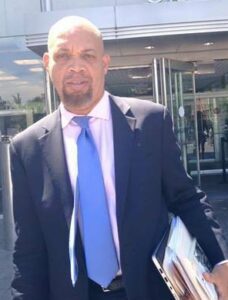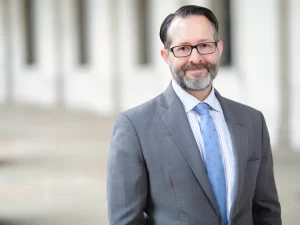Best Criminal Lawyer in Washington, DC
DAVID BENOWITZ
Criminal Lawyer
The National Board of Trial Advocacy has certified David as a Board Certified Criminal Trial Advocate, which indicates that he meets their exceptionally high standards of professionalism and experience. He is currently the only attorney in the Washington, D.C., area to carry this distinction. David is a faculty member at Harvard Law School’s renowned Trial Advocacy Workshop and NITA’s Building Trial Skills Seminar at Georgetown Law School, and he has been interviewed on national television regarding high-profile cases.
Additionally, the National Trial Lawyers – Top 100 Trial Lawyers has honored David as one of the top trial lawyers in the area, and he has received the highest possible rating from Martindale-Hubbell of AV-Preeminent*, which is a peer review rating that recognizes his knowledge, integrity, and professionalism in the field.
David obtained his Juris Doctor from George Washington Law School, where he was involved in the D.C. Law Students in Court Program. He was also a member of the George Washington Law Review and Moot Court Board. David went on to Temple University, where he received an LL.M. in Trial Advocacy in 2006. Upon graduation from school in 1995, he worked as a Staff Attorney for the Public Defender Service for the District of Columbia recognized as the top public defender’s office in the nation, until 2001.
K. Lawson Wellington
Criminal Lawyer
Attorney Wellington’s DC and Maryland practice is focused on personal injury, family law, DUI and criminal defense. A zealous advocate with vast courtroom and trial experience, he is passionate about clients’ rights.
Mr. Wellington was also a partner at Williams and Wellington, a general practice law firm in Washington, DC where he represented clients in criminal and civil cases. He has represented clients in the courtroom, administrative hearings, and/or alternate dispute resolution matters in Washington, D.C. and Maryland.
Attorney Wellington is licensed in the State of Maryland and the District of Columbia and is admitted to practice in the following courts:
Maryland State Court of Appeals and its lower Courts
District of Columbia Court of Appeals and its lower Courts
Mr. Wellington earned his juris doctorate in 1995 from Howard University School of Law. He also received his Bachelor of Arts degree in Sociology, with a Minor in English Literature, from Howard University, Washington, DC in 1992.
Mr. Okeke has over fifteen (15) years experience as a litigation attorney. Areas of practice includes criminal defense, civil/human rights law and immigration. Between 1997 and 2001, Mr. Okeke was a managing partner in the law firm of Augustine Okeke, LLP., in Washington DC. His primary areas of practice were criminal defense and civil/human rights law; representing over two thousand defendants in criminal cases. He has also argued over three hundred habeas corpus motions on behalf of defendants illegally detained by the government.
From 2002 to 2007, Mr. Okeke worked for the State of Maryland as an Assistant Public Defender for the City of Baltimore. In this capacity, Mr. Okeke represented over five thousand criminal defendants in cases before the courts. He has had over one hundred (100) jury trials with in excess of 70 percent resulting in acquittals. In addition, he successfully litigated hundreds of habeas corpus motions on behalf of illegally detained litigants.
In 2008, Mr. Okeke returned to private practice where he now focuses his attention on criminal defense and human rights law. He is licensed to practice law in Maryland and the District of Columbia.
Justin Ervin, Esq.
Criminal Lawyer
Justin Ervin is a Virginia criminal defense attorney based in Alexandria, Virginia, and he is a founding partner of Ervin Kibria PLLC.
Justin graduated from the George Mason University School of Law in May 2010, and he was admitted to the Virginia bar the same year. Throughout law school, Justin worked full-time as a law clerk for the Public Defender Service for the District of Columbia (‘PDS’), personally representing hundreds of inmates of DC Jail during their disciplinary hearings. Justin also worked with the PDS staff attorneys to represent clients in a wide-range of cases, including alcohol-related offenses, drug offenses, violent crimes, and theft-related offenses.
After graduating law school, Justin spent two years as an Associate Attorney with Kotchen & Low LLP, an antitrust and intellectual property firm located in Washington, DC. In addition to practicing law, Justin co-owns and operates two successful legal research companies, and he left Kotchen & Low in 2012 to focus on these businesses. Justin’s passion for the courtroom, and in particular, for criminal defense, however, drew him back to the practice of law and led to the creation of Ervin Kibria PLLC.
Justin understands that his clients are coming to him in some of the most stressful times in their lives. Clients value him because of his compassion and ability to relieve their stress through his excellent advocacy. He firmly believes that everyone who goes through the system, whether they are accused of violating the law, going through a divorce, being evicted, or just want to write up a will, needs an advocate. They need someone on their side -someone who will listen to them, address their needs, explain the complex and sometimes contradictory aspects of the law. In addition, by keeping his overhead low, he knows he can offer reasonable prices to help people with all sorts of legal problems.
Justin enjoys litigating cases. He is always willing to conduct a motion hearing or trial. It is his belief that being prepared and willing to fight for his clients is the only way to practice criminal defense. Each motion hearing and trial brings with it additional and invaluable experience and as an attorney you should always try to be better and get better for your client. This is the dedication and passion Justin brings to Ervin Kibria PLLC.
Outside of the courtroom, Justin is an avid sports fan and can usually be found either watching or playing one sport or another. As a University of Arizona alumnus, Justin is a devoted Wildcat fan as well as a diehard Arizona Diamondbacks and Phoenix Suns fan.
Sweta Patel
Criminal Lawyer
Sweta Patel is a litigation attorney and partner at Bruckheim & Patel, specializing in criminal defense, civil litigation, and family law. She has litigated a wide range of cases, from DUI and assault to drug trafficking and other serious felonies, including sex abuse allegations, robbery, and murder charges.
In her role at Bruckheim & Patel, Ms. Patel works very closely with founding partner Michael Bruckheim, defending cases within the District of Columbia and Maryland. Together, they litigate personal injury cases and have pending lawsuits against police departments for constitutional rights violations.
Ms. Patel is prepared to defend your rights with compassion and strength from overzealous prosecutors and law enforcement. Her extensive trial experience allows her to deftly navigate the D.C. court system while developing the strongest defense strategies possible.
Prior to joining Bruckheim & Patel, Ms. Patel worked extensively as a criminal defense attorney in the District of Columbia and Florida, representing adults and juveniles facing misdemeanor and felony charges. She formerly worked for a litigation defense firm in the District of Columbia.
She served as an assistant public defender in DC, where she gained significant trial experience with cases that included allegations of various crimes, including attempted murder, sexual assault, gun possession charges, drug trafficking, burglary, robbery, and driving under the influence (DUI).
Hannah Akintoye
Criminal Lawyer
Attorney Hannah Akintoye, is a social justice speaker, and the Managing Attorney of Hannah Akintoye Law, PLLC, a leading Washington, DC law firm focused on criminal defense, criminal record-sealing, DUI, and injury representation.
Attorney Akintoye received her bachelor’s degree from The Pennsylvania State University and went on to attend law school at the University of Pittsburgh School of Law where she obtained her Juris Doctor degree. While attending the University of Pittsburgh, she also completed the necessary coursework to obtain her litigation certificate from the University.
Before starting her law firm, Attorney Akintoye worked for a general practice law firm handling both civil and criminal matters, and also worked in various capacities within the public interest sector due to her longstanding dedication to sow back to her community. During Attorney Akintoye’s tenure as a public interest attorney handling criminal defense matters, she maintained an extensive caseload eventually representing hundreds of individuals in trial matters.
Attorney Akintoye has over a decade of courtroom litigation experience, which she embraces when representing her clients, and is dedicated to achieving the best possible resolution for each client matter. Attorney Akintoye also enjoys educating her community on their legal rights and is an advocate for fair treatment of those involved in the criminal justice system.
Ada Chan
Criminal Lawyer
I love helping people. I have learned that being a great criminal defense lawyer does not always mean winning in the courtroom but rather put together resolutions outside of the court room that better the individual. I represent people from all walks of life facing a wide range of serious criminal charges. I am a native of Hong Kong. I spent my formative years in England and Germany. Thereafter, I attended Oregon State University, earned a Bachelor of Arts Degree. I received my Juris Doctor from the District of Columbia School of Law. I am admitted to practice law in Maryland and D.C. I began my legal career as an immigration attorney in 1996 and handled a variety of cases, including H-1B visas, Labor Certification, Political Asylum, Adjustment of Status, K visas, removal of conditional status, petition for relatives and naturalization petitions. In 1998, I joined partnership with Mark M. Rollins, Esq. to form the Law Firm of Rollins and Chan. I am fluent in Chinese. See also Profile in Justia.
Bar Admissions
State of Maryland, 1996
United States District Court for Maryland
United States District Court District of Columbia
District of Columbia, 1997
David Clark school of Law, Washington, DC J.D.
Oregon State University
B.A. – 1992
Major: Liberal Studies
Jay P. Mykytiuk
Criminal Lawyer
During almost two decades of defending criminal and serious traffic cases in Washington, D.C. and Northern Virginia, Jay P. Mykytiuk has built a reputation as a skilled and reliable trial lawyer. Respected by his clients and his peers, Jay has been recognized as a Washington, D.C. Super Lawyer and by the National Trial Lawyers Association as one of the Top 100 Trial Lawyers in the region. He has the highest peer-reviewed rating from Martindale-Hubbell of “AV-Preeminent”–scoring a perfect 5.0 of 5.0, reflecting the highest level of professional excellence.
Learning to swim in the deep end, Mr. Mykytiuk began his legal career with the Arlington County Public Defender’s Office, where he handled hundreds of serious criminal cases before transitioning to private practice at a major DC law firm, and later, as a solo practitioner. Prior to co-founding Monument Legal, Mr. Mykytiuk was a Partner at the Criminal Defense firm of Scrofano Law, PC. for eight years. There, he handled felonies, misdemeanors, serious traffic offenses, and Civil Protection Orders in D.C. Superior Court and in Arlington, Alexandria, and Fairfax counties. He appears regularly in federal court in Washington, D.C. and is a member of the Criminal Justice Act panel in the United States District Court for the Eastern District of Virginia.
Camille Wagner
Criminal Lawyer
Camille is a French native and speaks three languages: French, Spanish, and English. Her diverse background creates a unique approach to the practice of law. Camille graduated from UDC School of Law and was an Assistant Attorney General in the district before becoming a private practitioner. As a former prosecutor, Camille has the inside knowledge and experience she needs to take cases to trial, fighting and defending her clients to the end. She now focuses her practice to fighting for her clients in both Federal and State Courts in D.C. and Maryland.
What is important is not what you did but whom you know.
Now, you know Camille
Gun Charge in DC with a Prior Felony Conviction: Legal Consequences and Defenses
The United States has strict gun laws, especially in its capital, Washington, D.C. For individuals with a prior felony conviction, these laws become even more stringent. Being charged with a gun-related offense in Washington, D.C., while having a prior felony conviction can lead to severe legal consequences, including long prison sentences, heavy fines, and additional complications in the justice system. Understanding the implications of such a charge and the potential defenses available is critical for anyone facing this situation.
Washington, D.C.’s Gun Laws and Restrictions for Felons
Washington, D.C., has some of the most restrictive gun control laws in the country. The city’s laws aim to prevent gun violence by regulating who can possess or carry firearms. One of the strictest provisions involves individuals who have been convicted of a felony. Under both federal and D.C. law, individuals with prior felony convictions are prohibited from possessing or purchasing firearms.
The law that addresses this restriction is known as the Felon in Possession of a Firearm statute. In Washington, D.C., this falls under D.C. Code Section 22-4503, which makes it illegal for anyone with a prior felony conviction to possess a firearm, ammunition, or any other weapon. A person who violates this law can face severe penalties, particularly if they already have a criminal record.
Legal Consequences of a Gun Charge with a Prior Felony Conviction
The penalties for being caught with a firearm as a felon in Washington, D.C., are severe. If an individual is found guilty of possessing a gun while having a prior felony conviction, they could face significant legal repercussions, including:
Prison Time: A felon convicted of possessing a firearm in D.C. can face a prison sentence ranging from one to 10 years, depending on the specifics of the case. If the person has multiple prior convictions, the sentence could be even longer. Under federal law, the sentence can reach up to 15 years if the felon has a history of violent crimes or drug trafficking offenses.
Fines: Along with a lengthy prison sentence, individuals convicted of a gun charge with a prior felony conviction can also face heavy fines. In D.C., these fines can be as high as $25,000, adding a significant financial burden to an already dire situation.
Loss of Rights: A felony conviction already results in the loss of several civil rights, including the right to vote, hold public office, and possess firearms. A subsequent conviction for a gun charge can further restrict an individual’s rights, making it more challenging to reintegrate into society after serving their sentence.
Impact on Probation or Parole: If an individual is on probation or parole for a previous offense, a new gun charge can lead to the revocation of these privileges. This means that the person may be required to serve the remainder of their sentence in prison, in addition to the new penalties imposed for the gun charge.
Federal vs. State Charges: Gun possession by a felon can be prosecuted under both federal and D.C. laws. In many cases, federal authorities may choose to prosecute the case, leading to even harsher penalties. Federal laws, like the Armed Career Criminal Act (ACCA), impose mandatory minimum sentences on felons caught with firearms if they have multiple prior convictions.
Legal Defenses for Gun Charges with a Prior Felony Conviction
Although gun charges with a prior felony conviction carry severe penalties, there are several legal defenses that an experienced attorney may use to challenge the charges. Some of the most common defenses include:
Lack of Knowledge or Intent: One of the key elements of a felon in possession of a firearm charge is that the individual knowingly possessed the weapon. If the defense can demonstrate that the defendant did not know they were in possession of the firearm, or that they had no intent to possess it, the charges may be reduced or dismissed. For example, if the firearm was found in a vehicle that the defendant was borrowing and they were unaware of its presence, this could form the basis of a defense.
Unlawful Search and Seizure: The Fourth Amendment of the U.S. Constitution protects individuals from unlawful searches and seizures. If law enforcement obtained the firearm without a proper warrant or through illegal search methods, the defense could argue that the evidence (the firearm) should be suppressed and not used in court. This could lead to the dismissal of the charges or a significant weakening of the prosecution’s case.
Inaccurate or Insufficient Evidence: In some cases, the prosecution may not have enough evidence to prove beyond a reasonable doubt that the defendant was in possession of the firearm. For example, if the weapon was found in a shared space or belonged to someone else, the defense may argue that the connection between the defendant and the gun is too weak to support a conviction.
Constructive Possession vs. Actual Possession: Possession can be categorized as actual possession (when the firearm is physically in the defendant’s control, such as in their hand or on their person) or constructive possession (when the firearm is in a location over which the defendant has control, such as their home or car). Defending against a constructive possession charge can be more complex because it does not require physical possession of the weapon. However, the defense can argue that the defendant did not have control over the location where the firearm was found or that the gun belonged to someone else.
Challenge to the Felony Conviction: In rare cases, the defense may challenge the underlying felony conviction that prohibits the defendant from possessing a firearm. If the prior conviction can be overturned or expunged, the charges related to gun possession may no longer apply. However, this is an unlikely scenario and would require significant legal effort and resources.
Necessity or Coercion: In some cases, individuals may be forced to possess a firearm due to extreme circumstances. For example, if the defendant was under immediate threat of harm or coerced into possessing the weapon, the defense of necessity or coercion may be raised. This defense is rarely successful but may apply in cases where the defendant had no reasonable alternative but to possess the firearm for their own protection.
How an Attorney Can Help
Facing a gun charge in Washington, D.C., with a prior felony conviction is a serious matter that requires skilled legal representation. A knowledgeable criminal defense attorney can provide essential guidance and help craft a defense strategy tailored to the specific circumstances of the case. Attorneys can help by:
- Evaluating the evidence: An experienced attorney will review the evidence against the defendant, identifying any weaknesses in the prosecution’s case or violations of the defendant’s constitutional rights.
- Negotiating with prosecutors: In some cases, an attorney may be able to negotiate a plea deal that reduces the charges or penalties. This can be especially important for defendants facing the possibility of a long prison sentence.
- Representing the defendant in court: If the case goes to trial, an attorney will advocate for the defendant’s rights, presenting evidence and arguments that challenge the prosecution’s case and seek the best possible outcome.
Conclusion
A gun charge in Washington, D.C., with a prior felony conviction carries severe penalties, including long prison sentences, heavy fines, and a further loss of civil rights. The legal consequences can be life-altering, making it crucial for defendants to understand their rights and potential defenses. With the right legal strategy, it may be possible to challenge the charges and achieve a more favorable outcome. However, given the complexity of gun laws and the seriousness of the charges, it is essential for individuals in this situation to seek experienced legal representation as soon as possible.












